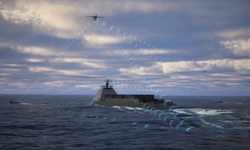NEODE Systems, the start-up launched by MBDA in January 2024 to accelerate the integration of artificial intelligence into defense systems, has been awarded its first contract by France’s defence procurement agency, the Direction Générale de l’Armement (DGA), on behalf of the French Army. The contract marks a significant step in MBDA’s broader strategy to enhance its systems through advanced software and digital technologies.
The new agreement focuses on demonstrating enhanced beyond-line-of-sight (BLOS) targeting capabilities using the Akeron MP missile, enabled by NEODE Systems’ Ground Warden—an AI-powered decision-making tool. A series of live-fire demonstrations is scheduled to take place before the end of the year, with the goal of validating the integration and moving toward a licensing phase.
Ground Warden is designed to support faster, more informed targeting decisions by fusing real-time data and applying machine learning algorithms tailored to complex operational environments. By integrating this tool with existing missile systems, NEODE aims to deliver a scalable solution that adapts to evolving battlefield threats.
NEODE Systems represents a new development model within MBDA, emphasizing agile and short-cycle innovation with direct involvement from end users throughout the process. This approach allows for rapid prototyping and quicker field deployment, challenging traditional defense procurement timelines that often span years.
Eric Béranger, CEO of MBDA, described NEODE Systems as a reflection of the group’s capacity to innovate and respond quickly to emerging operational needs. “NEODE Systems demonstrates our agility and our ability to apply artificial intelligence to optimize battlefield performance,” Béranger said, adding that such initiatives are key to maintaining a technological edge.
Laurent Duport, CEO of NEODE Systems, emphasized the significance of the company’s development and business models. “This first contract validates our approach—combining disruptive technologies like AI with a responsive development cycle and direct user feedback. Our software licensing model also enables continuous upgrades to weapon systems already in service, making the entire defense ecosystem more adaptive.”











